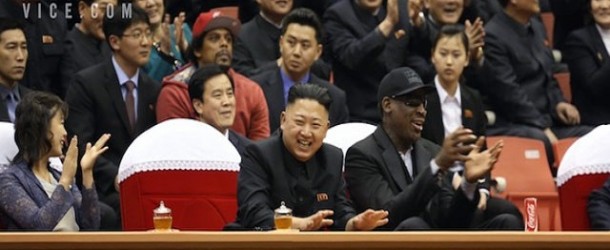Former American basketball star Dennis Rodman’s “basketball diplomacy” initiated since February 2013 has turned into a notable aspect in terms of the analysis of Washington-Pyongyang relations. Those in the U.S. and elsewhere around the world closely watch North Korean leader Kim Jong Un’s sympathy towards Rodman, his numerous visits to the country and audiences his receives with the Kim Jong Un.
Rodman’s initiative and organized basketball matchups between the athletes of both countries are reminiscent of America’s “ping pong” diplomacy with China in the 1970s. It was then that American and Chinese table tennis teams spearheaded an ice meltdown between the nations that remained on two different ideological poles.(1) Nevertheless, unlike the “ping pong” diplomacy, Rodman’s “basketball” version took a totally unlikely turn.
It must be stressed that Rodman’s initial contacts with the North Korean leader raised certain hopes in the West. The former also expressed hope that games held between the basketball teams of two nations would serve as an impetus to rapprochement of the peoples. Washington’s position on the other hand was reserved and limited to a statement that it did not oppose visits of its citizens to North Korea.(2)
Rodman however, failed to live up to the expectations of the American public, while the Western experts are of the opinion that it was the North Korean leader that benefited from this “basketball diplomacy”. Apparently, the concerns emanate from controversial image that may be projected by Kim Jong Un, known for his ruthless governance methods, thanks to being an avid basketball fan that displays affection towards an American athlete standing “slightly” below the state leader in terms of the official status.
On the other hand, contrary to the expectations of some U.S. quarters and the media, Rodman failed to put to use his close personal relations with Kim Jong Un to influence him on the issues of human rights and nuclear policy nor did he champion the release of the U.S. citizen held in the North Korean custody. All of that had cast a greater shadow upon the success of the mission assumed by Rodman.
Rodman’s admiration towards the North Korean leader was more evident during his fourth voyage, in the beginning of the 2014. While depicting his sympathy towards the leader of the country he went as far as justifying the 15 years prison sentence for the U.S. citizen.(3) This was a sign that once dubbed an “unofficial ambassador” by the Western media – Rodman had let his personal feelings override the national interests of his country.
Rodman eventually came under the fire of criticism from human rights organizations and former politicians. Local media even accused some of the colleagues accompanying Rodman of treason and being bought. In the face of the mounting pressure Rodman was compelled to apologize for his remarks and for failing to uphold his nation’s interests.(4, 5) Now there are two looming options for Rodman: abandon his “basketball diplomacy”, halt his trips to North Korea and sever his ties with Kim or continue his mission, in line with the expectations of the American public, and presumably, the official Washington.
Meanwhile, with failed “basketball diplomacy” on the backdrop, tension in the U.S.-North Korea relations is growing, as Kim Jong Un chooses nuclear saber-rattling towards regional powers and the US.(6) America on the other hand, is determined to boost its military presence in the South Korea that remains in the state of war with the North. South Korean government agreed to allocate $867 million in the 2014 for stationing of the U.S. military installations in the country – 5.8% growth compared to the previous year.
It must be stressed that based on 1991 arrangements, South Korea covers portion of expenses related with the stationing and service of the U.S. military. 5 year agreement signed between the two countries in 2012 provides for the South Korean side to cover 40% of the expenses related with stationing of the 28.500 U.S. servicemen in the country. Due to troop pullout from Afghanistan and Iraq, the U.S. government intends to deploy extra troops and tanks to South Korea by February, in order to maintain the balance the power in Asia.(7) This move will inevitably exacerbate America’s relations with China and South Korea.
Apparently, political processes in the East Asia are acquiring more perplex nature, while Rodman’s “basketball diplomacy” appears as a failed endeavor incapable of impacting the current developments.
Hülya MAMMADLI
References
- http://www.theguardian.com/sport/2014/jan/08/dennis-rodman-north-korea-ping-pong-diplomacy
- http://www.theguardian.com/world/2013/mar/01/dennis-rodman-kim-jong-un
- http://edition.cnn.com/2014/01/07/world/asia/north-korea-dennis-rodman/
- http://edition.cnn.com/2014/01/09/world/asia/north-korea-dennis-rodman-apology/
- http://www.foxnews.com/world/2014/01/13/rodman-apologizes-for-not-helping-american-missionary-held-in-north-korea/
- http://www.aljazeera.com/news/asia-pacific/2014/01/kim-threatens-us-nuclear-warning-20141111822363569.html
- http://www.reuters.com/article/2014/01/12/us-korea-us-defense-idUSBREA0B01S20140112
Kaynak: Newtimes.az

























































